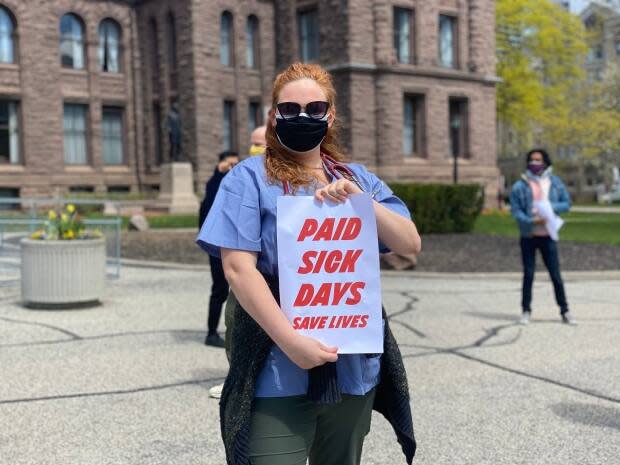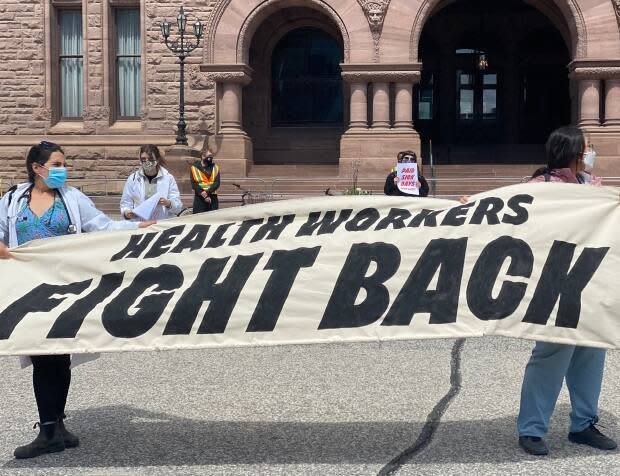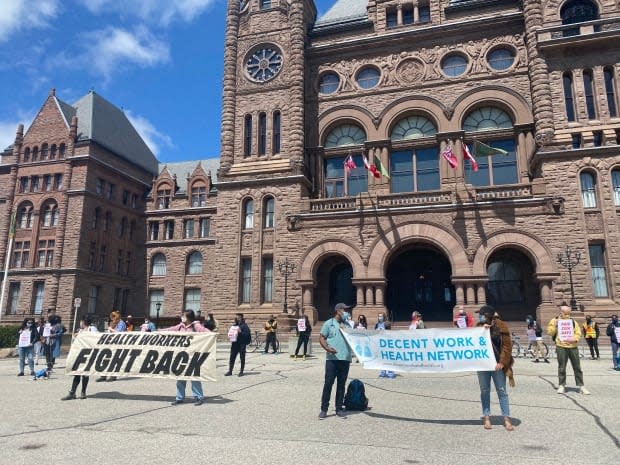Health workers rally at Queen's Park to demand province make changes to pandemic response

Health care workers staged what they called a "pop-up protest" at Queen's Park on Sunday to demand that the Ontario government take an evidence-based approach to dealing with the pandemic.
The demonstration, in which workers were masked and physically distanced, was organized by Health Providers Against Poverty, the Toronto Street Nurses Network and the Decent Work and Health Network.
The workers said they want:
Ten permanent sick days paid by employers for all workers yearly and an additional 14 days in a public health emergency.
A pandemic response that puts an emphasis on public health instead of policing.
Vaccination of essential workers, including those who are uninsured and undocumented, and vaccination of residents of hotspots and marginalized communities.
The health care workers said they have seen first-hand how the government's pandemic response has affected Black, Indigenous and racialized people, low wage workers and people living in poverty, those without health insurance, those with precarious immigration status and those living in congregate settings such as shelters, long-term care homes and prisons.
Dr. Gaibrie Stephen, an emergency room physician in Peel Region, said these measures would help to save lives. He said health care workers are very frustrated because much suffering could have been prevented by changes in provincial policies, which workers have been calling for for months.
"There are real systemic vulnerabilities here that are impacting people's lives. People are dying. That's why we're out here. That's why we're asking for these specific measures that we know are based on evidence," Stephen said on Sunday.
"This isn't just platitudes. This is real hard policy."
Stephen said daily COVID-19 case numbers are not just numbers, but they represent individual people and doctors see a need to speak out now because of a lack of response from the province.

Melanie Spence, a registered nurse who works in a shelter and a member of the Toronto Street Nurses Network, said people who are the most marginalized are paying the highest price in the pandemic.
"We're here because we are fed up with Premier Doug Ford playing politics with people's lives. Health workers across Ontario are outraged, we're upset, we're angry and we're tired of watching our colleagues and patients fall sick and die," she said.
"There's a lot of outrage. There's a lot of anger. I think that's why so many people came here today. We're here because as exhausted as we are, we are all really angry."
The health care professionals said they also are becoming increasingly concerned over the fact that the number of patients with COVID-19 in intensive care units in Ontario hospitals has been steadily increasing. The number has reached a new high each day for the past 19 days.
Ford said on Thursday that his government has started work on a paid sick leave program after months of insisting that the program offered by the federal government was sufficient. The provincial government recently voted down a bill by the NDP that would have granted all workers access to paid sick days provided by their employers.


